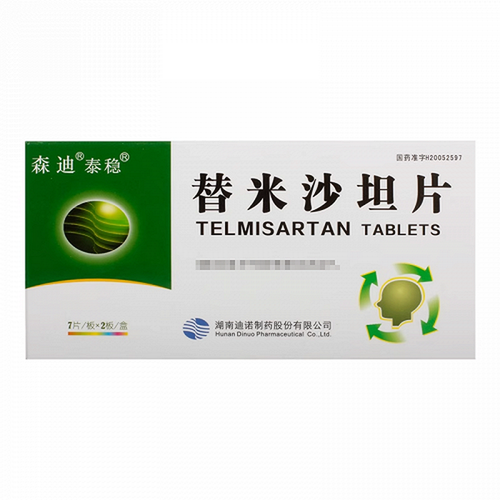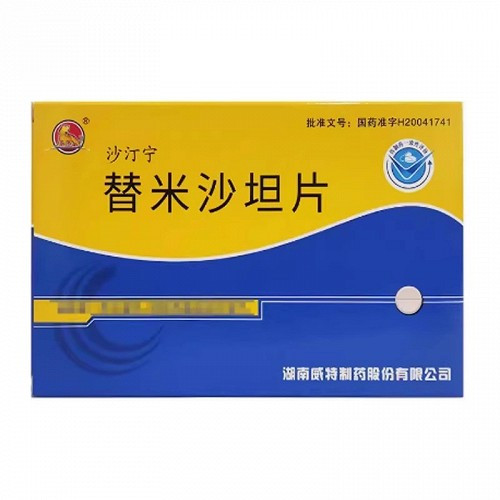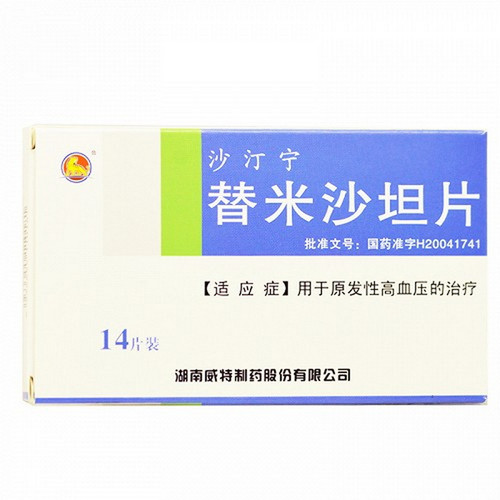Product Overview
[Drug Name]
Generic Name: Telmisartan Tablets
Trade Name: NiDeShu Telmisartan Tablets 40mg*30 Tablets
Pinyin Full Code: NiDeShu TiMiShaTanPian 40mg*30 Tablets
[Main Ingredient]
The main ingredient of this product is telmisartan.
[Indications/Main Functions]
For the treatment of essential hypertension
[Specifications]
40mg*30 tablets
[Dosage and Administration]
1. Adults: Dosing should be individualized. The usual initial dose is one tablet. This product can be used in combination with thiazide diuretics, such as hydrochlorothiazide, which have a synergistic antihypertensive effect. Because telmisartan takes 4 to 8 weeks to achieve its maximum effect, this should be considered when increasing the dose. 2. Patients with Renal Impairment: No dose adjustment is required for patients with mild to moderate renal impairment. Telmisartan is not eliminated by hemodialysis. 3. Patients with Hepatic Impairment: For patients with mild or moderate hepatic impairment, the daily dose of this product should not exceed one tablet. 4. Elderly: No dose adjustment is required for this product. 5. Children and Adolescents: Safety and efficacy data for this product have not been established in children and adolescents under 18 years of age.
[Adverse Reactions]
Adverse reactions are categorized by frequency as follows: Very Common (>1/10); Common (>1/100, <1/10); Uncommon (>1/1000, >1/100); Rare (>1/10,000, >1/1000); Very Rare (>1/10,000). 1. Systemic Reactions: Common: Back pain (e.g., sciatica), chest pain, flu-like symptoms, symptoms of infection (e.g., urinary tract infection including cystitis). Rare: Visual disturbances, hyperhidrosis. 2. Central and Peripheral Nervous System: Common: Dizziness. 3. Gastrointestinal System: Common: Abdominal pain, diarrhea, indigestion, gastrointestinal disturbances. Uncommon: Visual disturbances, hyperhidrosis. 4. Musculoskeletal System: Common: Arthralgia, leg cramps or pain, myalgia. 5. Nervous System: Rare: Anxiety. 6. Respiratory System: Common: Upper respiratory tract infections including pharyngitis and rhinitis. 7. Skin and Appendages: Common: Skin abnormalities such as eczema. 8. In addition, since the marketing of telmisartan, individual case reports have occurred of erythema, pruritus, syncope, insomnia, depression, stomach discomfort, vomiting, hypotension, bradycardia, tachycardia, dyspnea, eosinophilia, thrombocytopenia, weakness, and decreased work efficiency. Similar to other angiotensin-binding agents, angioedema, urticaria, and other related adverse reactions have been reported in rare cases.
[Contraindications]
1. Hypersensitivity to the active ingredient or any of the excipients of this product. 2. Pregnant women in their second or third trimesters or breastfeeding women. 3. Patients with biliary obstructive disease. 4. Patients with severe hepatic insufficiency. 5. Patients with severe renal impairment (creatinine clearance <30 ml/min)
[Drug Interactions]
1. Lithium. Concomitant use of lithium with angiotensin-converting enzyme inhibitors can cause reversible increases in blood lithium levels and toxic reactions. Isolated cases have also been reported when lithium is used with angiotensin-receptor antagonists. Therefore, caution should be exercised when lithium is used concomitantly with this product. If coadministration is necessary, serum potassium levels should be monitored during coadministration. 2. Certain medications can affect serum potassium levels or cause hyperkalemia (such as ACE inhibitors, potassium-sparing diuretics, potassium ion diuretics, potassium ion supplements, potassium-containing salt substitutes, cyclosporine A, or other medications such as heparin sodium). If this product is used concomitantly with these medications, monitoring of serum potassium levels is recommended. Based on experience with other medications that affect the renin-angiotensin system, concomitant use of this product with these medications may result in increases in serum potassium levels (see Precautions). 3. Pharmacokinetic studies have investigated drug interactions with digoxin, warfarin, hydrochlorothiazide, glyburide, ibuprofen, acetaminophen, and amlodipine. This product may increase the mean trough plasma concentration of digoxin by 20% (in some cases by 39%), so peak digoxin plasma concentrations should be monitored. 4. This product may enhance the antihypertensive effect of other antihypertensive drugs. Other clinical interactions have not been confirmed. 5. Based on their pharmacological properties, the following drugs may enhance the antihypertensive effect of antihypertensive drugs, including telmisartan: baclofen and amifostine. Additionally, alcohol, barbiturates, sedatives, hypnotics, or antidepressants may potentiate the orthostatic hypotensive effect.
[Precautions]
1. Hepatic Impairment: This product should not be used in patients with cholestasis, obstructive biliary disease, or severe hepatic impairment, as telmisartan is largely excreted in the bile, and clearance of this product may be reduced in these patients. This product should be used with caution in patients with mild to moderate hepatic impairment. 2. Renovascular Hypertension: In patients with bilateral renal artery stenosis or stenosis of a single functioning kidney, the use of drugs that affect the renin-angiotensin-aldosterone system increases the risk of severe hypotension and renal insufficiency. 3. Renal Insufficiency and Renal Transplant Patients: This product should not be used in patients with severe renal insufficiency (creatinine clearance <30 ml/min, see Contraindications). For patients with renal insufficiency, serum potassium and creatinine levels should be monitored regularly during use of this product. There are no data on the use of this product in patients shortly after a recent renal transplant. 4. Patients with Volume Depletion: In patients with volume depletion or low serum sodium levels due to strong diuretic therapy, salt restriction, nausea, or vomiting, this product, especially after the first dose, may cause symptomatic hypotension. Therefore, serum sodium and blood volume levels should be corrected before use of this product. 5. Other Conditions Related to Stimulation of the Renin-Angiotensin-Aldosterone System: For patients whose vascular tone and renal function are primarily dependent on the activity of the renin-angiotensin-aldosterone system (such as those with severe congestive heart failure or renal disease including renal artery stenosis), use may affect this system.
[Pediatric Use]
Safety and efficacy data for this product have not been established in children and adolescents under 18 years of age.
[Elderly Use]
No dose adjustment is required for this product.
[Pharmacology and Toxicology]
Telmisartan is a specific angiotensin co-receptor (ATI type) antagonist. Telmisartan displaces the angiotensin co-receptor and binds with high affinity to the ATI receptor subtype (known angiotensin interaction site). Telmisartan has no agonist effect at any site within the ATI receptor site. Telmisartan binds selectively to the ATI receptor, and this binding is long-lasting. Telmisartan has no affinity for other receptors, including AT2 and other less well-characterized AT receptors. The functions of these other receptors are unknown, as is the potential for receptor overstimulation due to telmisartan-induced increases in angiotensin II levels. Telmisartan does not inhibit human plasma renin or block ion channels. Telmisartan does not inhibit angiotensin-converting enzyme II, which can also enhance bradykinin degradation, leading to adverse reactions. In humans, administration of 80 mg of telmisartan almost completely inhibits the angiotensin II-induced blood pressure increase. This inhibitory effect persists for 24 hours and is still measurable after 48 hours. The antihypertensive effect becomes increasingly evident within 3 hours of the first dose of telmisartan. Maximum antihypertensive effect is achieved within 4 weeks of treatment and can be maintained with long-term treatment. If telmisartan treatment is abruptly discontinued, blood pressure gradually returns to pre-treatment levels over several days, without rebound hypertension. In a clinical trial directly comparing two antihypertensive medications, the incidence of dry cough was significantly lower in patients treated with telmisartan than in those treated with an angiotensin-converting enzyme inhibitor.








